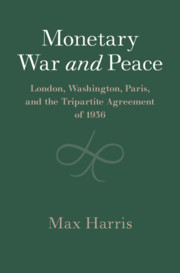Book contents
- Monetary War and Peace
- Studies in Macroeconomic History
- Monetary War and Peace
- Copyright page
- Contents
- Figures
- Tables
- Acknowledgments
- Abbreviations
- Introduction
- 1 A Classical Prelude, 1880–1914
- 2 Britain’s Biggest Blunder, 1914–1931
- 3 Hostilities Commence, 1931–1933
- 4 Washington Declares War, 1933–1935
- 5 Negotiating Peace, 1935–1936
- 6 A New Order, 1936–1939
- 7 Gold and Dollars, 1936–1937
- 8 Keeping France Afloat, 1937–1938
- 9 Battle for Sterling, 1938–1939
- 10 From Bretton Woods to Today
- Conclusion
- Book part
- References
- Index
- Series page
9 - Battle for Sterling, 1938–1939
Published online by Cambridge University Press: 24 February 2021
- Monetary War and Peace
- Studies in Macroeconomic History
- Monetary War and Peace
- Copyright page
- Contents
- Figures
- Tables
- Acknowledgments
- Abbreviations
- Introduction
- 1 A Classical Prelude, 1880–1914
- 2 Britain’s Biggest Blunder, 1914–1931
- 3 Hostilities Commence, 1931–1933
- 4 Washington Declares War, 1933–1935
- 5 Negotiating Peace, 1935–1936
- 6 A New Order, 1936–1939
- 7 Gold and Dollars, 1936–1937
- 8 Keeping France Afloat, 1937–1938
- 9 Battle for Sterling, 1938–1939
- 10 From Bretton Woods to Today
- Conclusion
- Book part
- References
- Index
- Series page
Summary
This chapter studies developments in Britain’s monetary system and relations during the harrowing run-up to war. The pound depreciated substantially beginning in the summer of 1938 as war scares caused capital to flee. While the depreciation could have led to the reemergence of a crippling animus among club members, a middle ground developed whereby Britain made good faith efforts to support the pound and other members acquiesced to its decline. The Tripartite Agreement continued to embody democratic solidarity and survived all the way up to the eruption of hostilities in fact and for some time thereafter in name, falling into abeyance due to the necessities of war finance rather than any disagreement between the parties. To defend the pound, Britain transferred the gold in the Bank of England to the Exchange Equalisation Account, thereby severing the remaining threads that had tied sterling to the metal and readying monetary policy for battle in what would become a total war.
- Type
- Chapter
- Information
- Monetary War and PeaceLondon, Washington, Paris, and the Tripartite Agreement of 1936, pp. 209 - 232Publisher: Cambridge University PressPrint publication year: 2021

